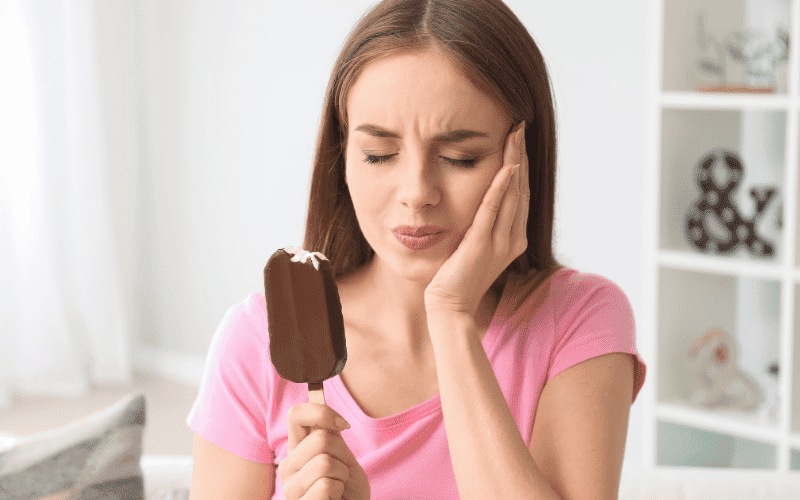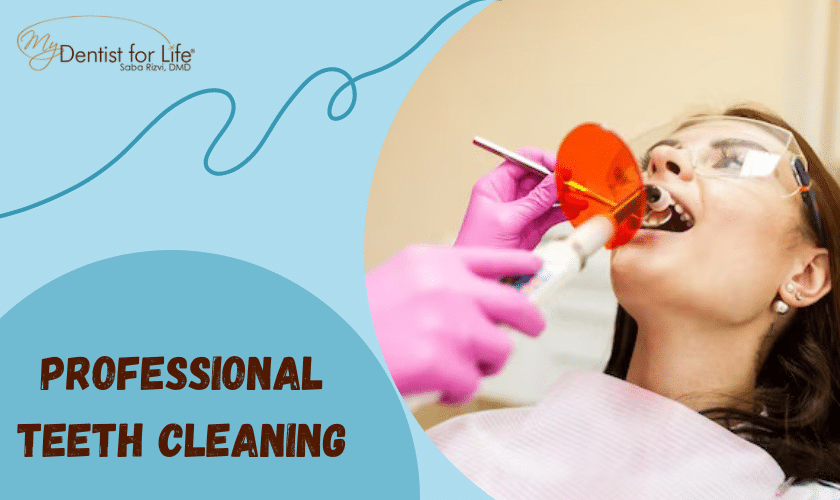ONLINE SCHEDULING AND VIRTUAL CONSULTS AVAILABLE

Why Are My Teeth Sensitive After A Dental Cleaning?

Ever walked out of a dental cleaning appointment and felt a sudden jolt of sensitivity in your teeth?
You’re not alone! Many people experience this surprising discomfort right after a professional cleaning. While it’s a common reaction, understanding why it happens can help you manage and prevent it.
Dental cleanings are essential for maintaining oral health, but they can sometimes leave your teeth feeling unusually sensitive. This blog will dive into the reasons behind this sensitivity, what you can do to ease it, and how to prevent it from becoming a recurring issue.
Let’s unravel the mystery behind why your teeth might feel extra sensitive after cleaning and explore effective strategies to keep your smile healthy and comfortable.
Ready to get to the bottom of it? Let’s get started!
What Causes Sensitivity After a Dental Cleaning?
Experiencing sensitivity after a dental cleaning is fairly common and usually temporary. This sensation primarily arises due to the following factors:
- Removal of Plaque and Tartar: During a cleaning, the dentist or hygienist removes built-up plaque and tartar. This process can temporarily expose areas of your teeth that were previously protected by these deposits.
- Gum Irritation: The cleaning process can irritate your gums, especially if they are already inflamed or sensitive. This irritation can contribute to overall tooth sensitivity.
- Polishing Agents: The polishing materials used during the cleaning can sometimes wear down enamel slightly, leading to temporary sensitivity.
If you notice that your teeth are sensitive after cleaning, it’s generally a sign that your mouth is adjusting to the newly cleaned surfaces. This sensitivity should decrease as your mouth heals and adjusts.
How to Alleviate Sensitivity After a Cleaning?
Managing sensitivity after a dental cleaning can make the experience more comfortable. Here are some effective strategies to help alleviate discomfort:
- Use Desensitizing Toothpaste: Products specifically designed to reduce sensitivity can help block the transmission of pain signals from the tooth’s surface to the nerves.
- Avoid Extreme Temperatures: Steer clear of very hot or cold foods and drinks immediately after your cleaning. Extreme temperatures can exacerbate sensitivity.
- Practice Gentle Brushing: Use a soft-bristled toothbrush and brush gently. Hard brushing can aggravate sensitive areas and damage the gums.
These steps can help soothe your teeth and make the recovery period smoother. If sensitivity persists, consult your dentist in Plantation for personalized advice and treatment options.
The Role of Enamel Erosion
Enamel erosion can play a significant role in how sensitive your teeth feel after a cleaning. Here’s how:
- Enamel Protection: Enamel acts as a protective barrier for the sensitive dentin underneath. If your enamel is worn down, your teeth may become more sensitive after a cleaning.
- Acidic Foods and Drinks: Consumption of acidic foods and beverages can erode enamel over time, making your teeth more susceptible to sensitivity after professional cleanings.
Maintaining strong enamel through proper oral hygiene and diet can help reduce the likelihood of experiencing heightened sensitivity after your dental visits.
Gum Health and Sensitivity
Your gum health directly affects how your teeth feel after a cleaning. Here’s what you should know:
- Gum Disease: If you have gum disease or gingivitis, the cleaning process can irritate your gums further, leading to increased sensitivity.
- Gum Recession: Receding gums expose the tooth roots, which are more sensitive than the enamel-covered surfaces. This exposure can lead to heightened sensitivity after cleaning.
When to Contact Your Dentist?
While sensitivity after cleaning is often normal, there are times when you should reach out to your dentist:
- Persistent Pain: If sensitivity continues for more than a few days or becomes severe, it’s time to consult your dentist.
- Signs of Infection: Increased swelling, redness, or bleeding from the gums can indicate an infection or other issues that need professional attention.
- Unusual Symptoms: If you experience any symptoms that seem out of the ordinary or if your sensitivity doesn’t improve, getting professional advice is crucial.
Regular check-ups can help address any underlying issues contributing to your sensitivity and ensure your oral health remains in top condition.
Tips for Preventing Sensitivity
Preventive measures can help minimize sensitivity both during and after your dental cleanings:
- Maintain Good Oral Hygiene: Brush and floss regularly to prevent plaque buildup and reduce the need for extensive cleanings.
- Visit Your Dentist Regularly: Regular cleanings and check-ups can help identify potential issues before they cause significant discomfort.
- Use Fluoride Products: Fluoride strengthens enamel and can help protect against sensitivity.
Tooth sensitivity after a dental cleaning is usually a temporary and manageable issue. Understanding its causes—such as plaque removal, gum irritation, and enamel erosion—can help you address and alleviate discomfort. By using desensitizing toothpaste, avoiding extreme temperatures, and maintaining good oral hygiene, you can ease sensitivity and promote a smoother recovery. If sensitivity persists or worsens, consulting your dentist ensures that any underlying issues are addressed promptly, keeping your oral health on track.





